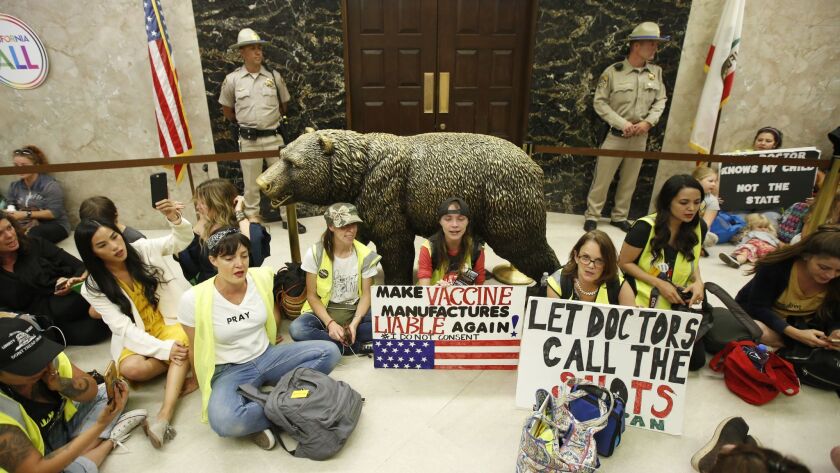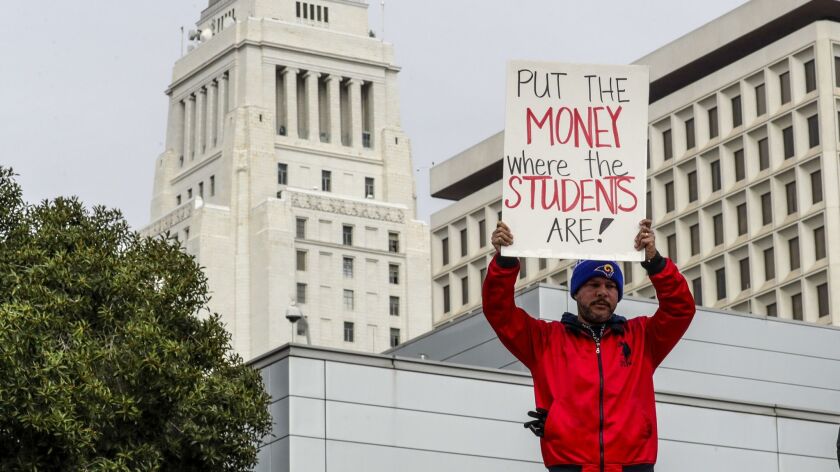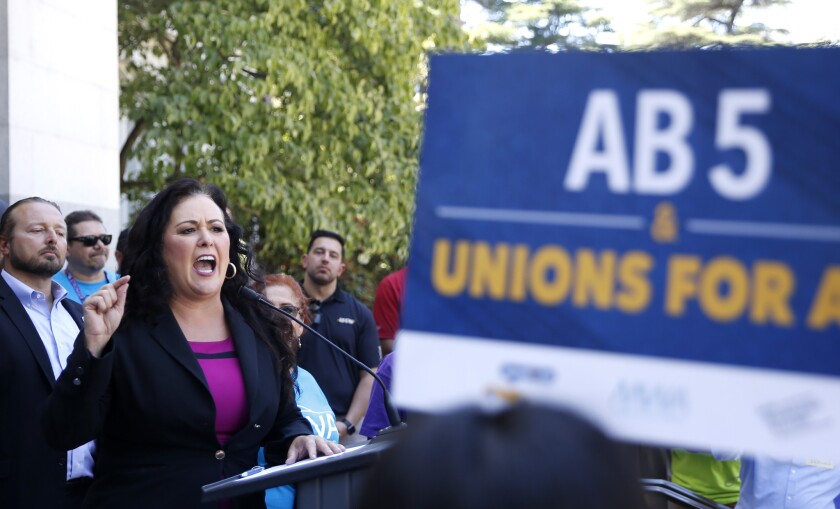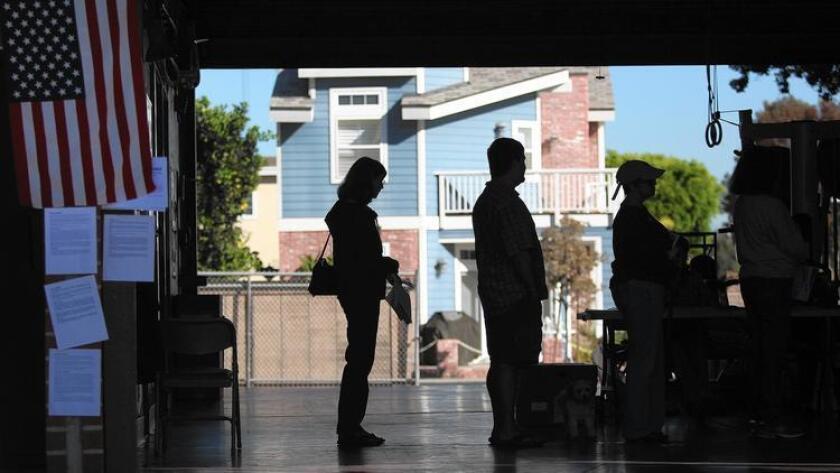How will California’s new laws affect you?
California will ring in 2020 with hundreds of new state laws addressing a range of issues including monthly limits on gun purchases, more protections against high-interest loans, increased pay for low-wage jobs and the end of touring circus shows featuring exotic animals.
Gov. Gavin Newsom signed almost 1,200 new laws this year, though not all of them take effect Jan. 1. Taken as a whole, the list embodies the uniquely Californian approach to governing. Most reflect the largely liberal viewpoint of the Legislature and its Democratic majority.
Guns

Employers, co-workers and teachers will be able to ask for a gun-violence restraining order against a person beginning in September — no longer leaving the gun seizures only to families and law enforcement.
If a judge agrees, one-year gun seizures from those who are thought to pose a danger to themselves or others could be extended annually for up to five years.
Only Californians age 21 or over will be able to buy a semi-automatic rifle. And starting in 2021, all Californians will be limited to buying one of the rifles per month.
A person banned from having a gun in another state can no longer legally possess one in California.
Healthcare

State health officials will create a new, standardized form doctors will fill out for parents who want a medical exemption from vaccinations for their children. Doctors will be required to use that form and parents must submit existing exemptions to the state in 2021. Doctors with five or more exemptions written after Jan. 1, 2020 will have their actions reviewed by the state.
Californians will be required to have health insurance, an “individual mandate” similar to the one under the federal Affordable Care Act that became inoperative in 2019. Penalties for failing to enroll in a healthcare plan won’t kick in until taxes are filed in April 2021.
Women seeking birth control pills through apps such as one offered by Planned Parenthood will no longer have to participate in video conferencing with a health professional for a prescription.
Food handlers will be required to take training on major food-based allergens. Those who seek a state-issued food handler card will have until the end of 2020 to do so. The law was prompted by the case of a Sacramento-area girl whose peanut allergy led to her death at a summer camp in 2013.
Education

School districts will have more power over the creation of new charter schools in their communities, and new teachers at charter schools will be required to hold the same credentials as those in traditional public schools (with the requirement being phased in over five years for existing teachers).
Children whose parents have unpaid school lunch bills won’t be denied access to at least an alternate meal selection, and can’t be shamed or treated differently than other students.
Students up to fifth grade can’t be suspended for disrupting school activities or willful defiance, effective with the school year that begins in August. Sixth-, seventh- and eighth-graders will also be protected from such suspensions for the next five years.
Schools must update records to accurately reflect a former student’s name or gender if changes have been made to the person’s official government identification. This includes reissuing high school diplomas, GEDs and transcripts, as needed.
On the job

Businesses planning to use independent contractors will be subject to new restrictions on the situations in which they can do so, and more of those workers will now be considered employees.
The minimum wage in California goes up by a dollar. Large employers must pay at least $13 an hour, while businesses with 25 or fewer workers can pay $12 an hour. The minimum wage will peak at $15 an hour in 2023.
Employers can no longer require current or new workers to agree to arbitration as a condition of having a job. The law is currently being challenged in court by the California Chamber of Commerce.
Californians who take out payday or installment loans of $2,500 to $9,999 will see interest rates capped at no more than 36%. That’s compared to the much higher rates some of these consumers, often with few other ways of borrowing money, have paid in the past.
Food service workers must wear gloves made of something other than latex, which causes allergic reactions in some customers. Seven other states now have similar laws.
Housing
An existing law that requires 90 days’ notice to renters who are evicted from a foreclosed property will stay on the books. The law was set to expire, but lawmakers made it permanent.
Strict new limits on rent increases will mean landlords can raise rates no more than 5% plus inflation each year. Renters in cities with existing, stricter controls will keep them, and some evictions will become harder to implement.
Landlords can no longer turn away a person whose rent will be partially paid with a Section 8 voucher.
California homeowners will have more flexibility to build “granny flats,” or small housing units, on their properties.
State anti-discrimination laws will now apply to renting apartments or homes through companies such as Airbnb and VRBO.
Criminal justice

Law enforcement officers can use deadly force only when it’s “necessary in defense of human life,” a standard created following fatal officer-involved shootings across California.
The state’s civil statute of limitations for childhood sexual abuse allegations has been extended for 14 additional years, allowing some to file claims up to age 40.
California inmates will no longer be charged a copay for medical care or fees for medically necessary items.
Sexual assault evidence collected through rape kits must be submitted to a crime lab within 20 days and tested within 120 days, a law prompted by reports of evidence samples that sat untested for years.
Californians now have a civil cause of action against anyone who distributes a fake sex video or photo with their likeness.
California officials can no longer sign contracts to use private, for-profit prisons.
Privacy

California will bar surveillance by drones and other electronic equipment in places where people have a reasonable expectation of privacy.
Californians will have more control over how their personal information is used and shared by companies. Consumers can also opt out of information sharing and request that companies delete their personal data. Read more of our coverage here.
Environment and wildlife

Trophy hunting of bobcats is illegal for the next five years and possibly longer, unless state wildlife officials approve a plan to preserve the animals’ overall population.
Smoking is now illegal in most parts of California state parks and beaches. Those who break the law are subject to a $25 fine.
New oil drilling in California will be prohibited from running pipelines across state-owned land — a strong push against any new drilling approved by the Trump administration.
Products that contain microbeads — found in some facial scrubs, soaps and toothpastes — are now illegal to sell in California after studies showed that the tiny plastics have been found in waterways and estuaries.
Trapping animals for the sale or use of fur is now illegal in California.
Any circus that uses animals other than domesticated dogs, cats or horses is banned from operating in California.
Politics

Political text messages must include the name of the candidate or group that paid for the message. In some cases, the text message must also include the names of the top donors to the effort.
Californians will be able to register to vote or change their party registration on election day in March and November at any local polling place.